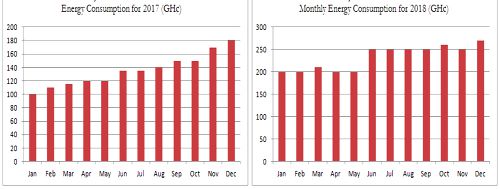
Reducing energy cost among SMEs
Though energy costs are a significant cost to many Small and Medium Enterprises (SMEs), majority of SMEs in Ghana are unable to tap into the numerous Energy Saving Opportunities (ESOs) to reduce energy costs and improve competitiveness and performance.
SMEs are central to the socio-economic development of the Ghanaian society.
Advertisement
According to the Ghana Statistical Service, highlights of the Ghanaian Economy report in 2017, they constitute about 99 per cent of all registered businesses in Ghana, provide a little over 70 per cent of jobs in the economy and contribute a significant proportion to the nation’s Gross Domestic Product (GDP).
The sector is also a major driver of innovation, social development and women empowerment.
It is well known that the sector has been facing numerous challenges ranging from the lack of access to finances to the limited in-house skills and expertise, inadequate capital, lack of information on prevailing and emerging opportunities and increasing operating costs.
It is known that when it comes to energy policy, the SME sector has often been overlooked.
A publication by the Change Chambers on Energy Efficiency and Management in Organisations found that collectively, SMEs consumed up to 13 per cent of total global energy demand.
In Ghana, a bulk of the inefficiencies in energy are from SMEs. Studies further disclosed that about 30 per cent of the sector’s energy demand in Ghana could be eliminated through the implementation of energy efficiency measures among the SMEs.
Today, amidst increasing energy costs, depletion of fossil fuels and environmental concerns, there are compelling reasons for SMEs to focus on energy efficiency in order to stay relevant, be competitive and survive.
Apart from the environmental benefits resulting from the reduced energy consumption, reduced emissions and energy security, there are cost benefits, improved competitiveness and overall operational performance that accrue to the enterprise.
There is substantial empirical evidence that suggests that energy efficiency can offer significant benefits to SMEs in cost savings (up to 35 per cent reduction in energy costs) and to become more resilient, competitive and innovative.
It is, therefore, clear that energy efficiency is beneficial to the successful operations of SMEs and logically, per the principle of rationality of the consumer and his or her objective to maximise utility or minimise the “bads”, SMEs should invest in energy efficiency projects to take advantage of the opportunities it offers.
Challenges with Energy Management and Efficiency
First of all, the general attitude of SMEs to energy management, irrespective of the energy cost –to-turnover ratio is very poor. Secondly, SMEs see energy costs related to energy consumption as overhead cost and treat them as such.
Thirdly, SMEs do not have dedicated staff responsible for energy issues, including demand management. Then also, SMEs do face high energy costs but put in less effort to either measure these costs overtime or assess the impact on business performances.
To the SMEs, energy costs are “giving” and little to nothing can be done to control them. Furthermore, energy management and control (EMC) is very poor among SMEs. The main EMC practices by SMEs are switching off lights after close of work (except security lighting from nearby streetlights) and during the day.
Again, there is a general lack of energy management expertise, awareness and information on available and emerging opportunities and technologies in energy demand management, lack of access to innovative sources of finance to implement energy management programmes for energy management relating to the purchase and use of energy-efficient equipment.
Lastly, besides the financial, capacity and informational constraints, most SMEs fail to act rationally to adopt and implement measures to manage their energy consumption.
This bonded rationality exhibited by a majority of SMEs arises from the focus on short-term benefits and cost analysis over sustainable long-term costs and benefits.
Reducing energy cost
The starting point for the successful implementation of energy cost reduction and efficiency measures is for SMEs to recognise and integrate energy into the core mission of their operations. They should recognise energy as a major input factor and not an overhead.
This will reorient them and compel them not only to speculate the impact of such an input to their operational costs but also ensure that energy costs are properly quantified and measured.
At the organisational level, the following strategies will help SMEs to reduce energy demand and reduce energy costs significantly,
i. Keep and track record of energy consumption in addition to their expenditure to aid in effective analysis
ii. Invest in installing timer switches which are programmed to switch appliances off when they are not required especially security lights which may not be needed during the day when no one is at work (weekends or holidays)
iii. Activate power save mode for appliances used intermittently such as computers, monitors, photocopiers, faxes, televisions and sound systems
iv. All electrical gadgets that are not in use should be switched off and preferably unplugged from the main sockets
v. Invest in energy-efficient equipment and replace fluorescent lights with LED (Light-Emitting Diode) bulbs which are noted for consuming only a third of the energy of fluorescent lights and have a potential of reducing light energy consumption by up to 80 per cent Gideon is an Extractive Policy Analyst at Penplusbytes.
Email: gideon.peasah @penplusbytes.org WhatsApp: 0246067976 and Waliu is a PhD Student at UENR .




